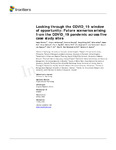Looking through the COVID-19 window of opportunity: Future scenarios arising from the COVID-19 pandemic across five case study sites
| dc.contributor.author | Richter, Isabel | |
| dc.contributor.author | Avillonosa, A | |
| dc.contributor.author | Cheung, VV | |
| dc.contributor.author | Goh, HC | |
| dc.contributor.author | Johari, S | |
| dc.contributor.author | Kay, S | |
| dc.contributor.author | Maharja, C | |
| dc.contributor.author | Nyguyen, TH | |
| dc.contributor.author | Pahl, Sabine | |
| dc.contributor.author | Sugarjito, J | |
| dc.contributor.author | Sumeldan, J | |
| dc.contributor.author | Nguyen, QV | |
| dc.contributor.author | Vu, HT | |
| dc.contributor.author | Ariffin, WNSWM | |
| dc.contributor.author | Austen, Melanie | |
| dc.date.accessioned | 2021-06-15T16:06:58Z | |
| dc.date.issued | 2021-07-07 | |
| dc.identifier.issn | 1664-1078 | |
| dc.identifier.issn | 1664-1078 | |
| dc.identifier.other | ARTN 635686 | |
| dc.identifier.uri | http://hdl.handle.net/10026.1/17255 | |
| dc.description.abstract |
<jats:p>The COVID-19 pandemic has caused (and continues to cause) severe disruption in global and local economies and has forced countries, societies, and individuals to adapt quickly to the unprecedented and unpredictable situations. Despite the obvious negative consequences of the pandemic, many have called for efforts to identify transformative opportunities for sustainable development throughout this disorderly time. In the present paper, we explore such potential opportunities in the context of an interdisciplinary, international research project, which is focusing on sustainable marine management in biosphere reserves and marine parks in Southeast Asia. During a virtual workshop conducted as part of the GCRF (Government’s Global Challenges Research Fund) Blue Communities Project, future scenarios were developed depicting the potential effects of the COVID-19 pandemic on five case study sites. All of these sites are in areas of internationally recognized outstanding ecological value (Taka Bonerate Kepulauan-Selayar Biosphere Reserve, Indonesia; Tun Mustapha Park, Sabah, Malaysia; Palawan Biosphere Reserve, Philippines; North Devon Biosphere Reserve, United Kingdom; Cu Lao Cham-Hoi An Biosphere Reserve, Vietnam). At the macro-level, economies, governance structures, and societal norms are undergoing big changes. At the micro-level, the livelihoods, lifestyles, and backyards of local residents have to adapt. Collaboratively, we explored how COVID-19 posed challenges in our five case study sites, but we also focused on the potential COVID-19-related windows of opportunity for future sustainable development. Opportunities could be identified in all three pillars of sustainable development: the environment, the society, and the economy. Although remarkable similarities can be found across all five sites, we conclude that there cannot be a “one-size-fits-all” solution to turn the tide toward achieving sustainable development. Just as before the pandemic, sustainable development starts with engaging with and understanding local environments, challenges, and situations; building on local knowledge; and developing tailor-made solutions for the communities <jats:italic>in situ</jats:italic>.</jats:p> | |
| dc.format.extent | 635686- | |
| dc.format.medium | Electronic-eCollection | |
| dc.language | eng | |
| dc.language.iso | en | |
| dc.publisher | Frontiers Media | |
| dc.rights | Attribution-NonCommercial-ShareAlike 4.0 International | |
| dc.rights | Attribution-NonCommercial-ShareAlike 4.0 International | |
| dc.rights | Attribution-NonCommercial-ShareAlike 4.0 International | |
| dc.rights | Attribution-NonCommercial-ShareAlike 4.0 International | |
| dc.rights | Attribution-NonCommercial-ShareAlike 4.0 International | |
| dc.rights | Attribution-NonCommercial-ShareAlike 4.0 International | |
| dc.rights | Attribution-NonCommercial-ShareAlike 4.0 International | |
| dc.rights | Attribution-NonCommercial-ShareAlike 4.0 International | |
| dc.rights.uri | http://creativecommons.org/licenses/by-nc-sa/4.0/ | |
| dc.rights.uri | http://creativecommons.org/licenses/by-nc-sa/4.0/ | |
| dc.rights.uri | http://creativecommons.org/licenses/by-nc-sa/4.0/ | |
| dc.rights.uri | http://creativecommons.org/licenses/by-nc-sa/4.0/ | |
| dc.rights.uri | http://creativecommons.org/licenses/by-nc-sa/4.0/ | |
| dc.rights.uri | http://creativecommons.org/licenses/by-nc-sa/4.0/ | |
| dc.rights.uri | http://creativecommons.org/licenses/by-nc-sa/4.0/ | |
| dc.rights.uri | http://creativecommons.org/licenses/by-nc-sa/4.0/ | |
| dc.subject | scenarios | |
| dc.subject | window of opportunity | |
| dc.subject | COVID-19 | |
| dc.subject | sustainable development | |
| dc.subject | Southeast Asia | |
| dc.subject | coastal communities | |
| dc.title | Looking through the COVID-19 window of opportunity: Future scenarios arising from the COVID-19 pandemic across five case study sites | |
| dc.type | journal-article | |
| dc.type | Journal Article | |
| plymouth.author-url | https://www.webofscience.com/api/gateway?GWVersion=2&SrcApp=PARTNER_APP&SrcAuth=LinksAMR&KeyUT=WOS:000674951500001&DestLinkType=FullRecord&DestApp=ALL_WOS&UsrCustomerID=11bb513d99f797142bcfeffcc58ea008 | |
| plymouth.volume | 12 | |
| plymouth.publication-status | Published online | |
| plymouth.journal | Frontiers in Psychology | |
| dc.identifier.doi | 10.3389/fpsyg.2021.635686 | |
| plymouth.organisational-group | /Plymouth | |
| plymouth.organisational-group | /Plymouth/Faculty of Health | |
| plymouth.organisational-group | /Plymouth/Faculty of Science and Engineering | |
| plymouth.organisational-group | /Plymouth/Faculty of Science and Engineering/School of Biological and Marine Sciences | |
| plymouth.organisational-group | /Plymouth/REF 2021 Researchers by UoA | |
| plymouth.organisational-group | /Plymouth/REF 2021 Researchers by UoA/UoA04 Psychology, Psychiatry and Neuroscience | |
| plymouth.organisational-group | /Plymouth/REF 2021 Researchers by UoA/UoA04 Psychology, Psychiatry and Neuroscience/UoA04 Psychology, Psychiatry and Neuroscience MANUAL | |
| plymouth.organisational-group | /Plymouth/REF 2021 Researchers by UoA/UoA14 Geography and Environmental Studies | |
| plymouth.organisational-group | /Plymouth/REF 2021 Researchers by UoA/UoA14 Geography and Environmental Studies/UoA14 Geography and Environmental Studies MANUAL | |
| plymouth.organisational-group | /Plymouth/Research Groups | |
| plymouth.organisational-group | /Plymouth/Research Groups/Centre for Brain, Cognition and Behaviour (CBCB) | |
| plymouth.organisational-group | /Plymouth/Research Groups/Centre for Brain, Cognition and Behaviour (CBCB)/Behaviour | |
| plymouth.organisational-group | /Plymouth/Research Groups/Institute of Health and Community | |
| plymouth.organisational-group | /Plymouth/Users by role | |
| plymouth.organisational-group | /Plymouth/Users by role/Academics | |
| plymouth.organisational-group | /Plymouth/Users by role/Researchers in ResearchFish submission | |
| dc.publisher.place | Switzerland | |
| dcterms.dateAccepted | 2021-06-11 | |
| dc.rights.embargodate | 2021-8-4 | |
| dc.identifier.eissn | 1664-1078 | |
| dc.rights.embargoperiod | Not known | |
| rioxxterms.versionofrecord | 10.3389/fpsyg.2021.635686 | |
| rioxxterms.licenseref.uri | http://creativecommons.org/licenses/by-nc-sa/4.0/ | |
| rioxxterms.licenseref.startdate | 2021-07-07 | |
| rioxxterms.type | Journal Article/Review |



